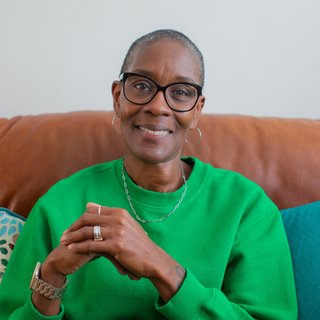Because people are less likely to understand what is wrong with them
76% of people with blood cancer say they were not told their condition was a type of blood cancer at the point of diagnosis. Franko talks about how this impacted his journey.
Understanding the condition is vital in taking back control
For people with blood cancer to process their diagnosis and take back control over their health, it's vital for them to understand what their diagnosis actually is.
Yet the Cancer Patient Experience Survey shows that people with blood cancer are less likely to leave their diagnosis fully understanding what is wrong with them compared to cases of other types of cancer. In blood cancer cases, just 68% fully understand their diagnosis, compared to 81% of people with breast or bowel cancer.
There are number of reasons for this, not least that blood cancer is a complex disease. But if people were to be told their condition is a type of blood cancer – rather than being left to make sense of terms like leukaemia, myeloma or lymphoma, that would massively aid understanding. These are terms derived from Latin and Greek, whereas ‘blood cancer’ is a phrase most people can understand.
Despite 88% of people affected by blood cancer agreeing that people should be told they have a type of blood cancer at diagnosis, three quarters (76%) of people with blood cancer say they were not told this at diagnosis.
Some never receive a diagnosis of blood cancer
Our survey suggests that 19% of people living with blood cancer have never been told they have blood cancer by a healthcare professional. Even worse, 6% of people who completed our survey found out for the first time that they had a blood cancer diagnosis through the survey itself, while 2% found out they had a type of cancer.
The likelihood of people finding out via our survey that they had a type of blood cancer doubled for the over 85s (8% vs 4% of 45-55s), those with a secondary level education (8% vs 4% undergraduate degree level), those with a below-average income (8% vs 4% above-average income), and those who classify themselves as an ethnic minority (14% vs 6% who classify themselves as white)*.
Unfortunately, this is a situation unique to blood cancer, as people affected by the other four common cancers – breast, lung, bowel, and prostate – are told that they have a form of cancer at the point of diagnosis.
What do healthcare professionals say?
Making sure everyone affected by blood cancer knows that their condition is a type of blood cancer may not completely solve the problem of people not understanding their diagnosis, but it would be a big step in the right direction.
It is a step change that many are already calling for – 80% of people with blood cancer and 84% of healthcare professionals agree this is needed.
The four critical stages
To make sure everyone leaves their diagnosis knowing they have a type of blood cancer, we believe there are four critical stages surrounding diagnosis in which the term 'blood cancer' should be used:
- The conversation where the person is told they have the condition
- The follow-up conversation with nurses that happens after diagnosis in many (but not all) cases
- The health information, both online and offline, which the person is signposted to
- The letter the person gets confirming their diagnosis
Gemma Trout, Senior Support Services Nurse, Blood Cancer UK:
“If our newly diagnosed patients are not told they have blood cancer, they can become alarmed when they later discover that they do. Having a complete diagnosis allows the patients to understand their treatment options along with areas of care and support they may need.”
Reducing the stigma around the phrase 'blood cancer'
We have heard from some healthcare professionals that they sometimes avoid using the term 'blood cancer' for fear of causing unnecessary distress. But our research shows that many people who are not told this at diagnosis go on to learn this later, with 13% of people with blood cancer finding out via either the internet or a health information booklet.
This issue is particularly important for helping overcome existing health inequalities, as our research suggested that people affected by blood cancer who were of Asian, Black, Mixed or other ethnic origin were almost twice as likely to find out that the condition they were affected by was a type of blood cancer via the internet.
Finding out you have a type of blood cancer is always going to be hard, but it’s much better that people hear it from a healthcare professional, who can set the context for people’s individual condition, and answer any questions or concerns, rather than leaving people to find out via 'Dr Google'.
Ultimately, people have a right to know what is wrong with them and withdrawing that information to be ‘kind’ or ‘soften the blow’ is causing more harm than good.

